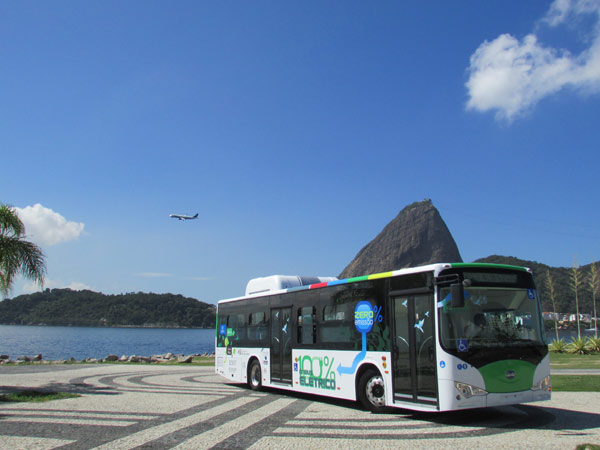BYD looks to change Brazil’s urban transit
Updated: 2015-03-02 04:58
By BRUNA GAMA in Rio de Janeiro(China Daily Latin America)
|
||||||||
 |
|
China’s electric vehicle and solar panel manufacturer BYD will open its first factory in Brazil this year. Provided to China Daily |
BYD, China’s electric-vehicle and solar-panel manufacturer, will open its first factory in Brazil this year, with the aim of revolutionizing the country’s urban transportation market.
Adalberto Maluf Filho, director of marketing and governmental affairs for Brazil at BYD, told China Daily that the company is ready to provide buses and taxis that are low-maintenance and non-polluting, a big concern in large cities such as Rio de Janeiro and Sao Paulo.
Brazil’s large cities face major challenges when it comes to urban transportation, and most do not have subway networks. Sao Paulo, Brazil’s largest and most populated city, has four subway lines. Rio has only two.
The slow pace of constructing railway and subway lines has increased the demand for express bus lines, but diesel buses pollute. Electric, non-polluting buses are a short-term viable option.
BYD is part of a consortium that last week won a public bidding to develop a car-sharing plan in Rio, initially for a fleet of 300 electric cars. After the plan is developed, companies will bid to operate the service. BYD will enter the bidding, according to Maluf, who said the company would have an advantage due to its familiarity with the project’s requirements.
“Those who carried out the implementation studies will have more knowledge about it,” he said.
BYD is establishing a factory in Campinas, Sao Paulo state, which will be operational by mid-2015. The factory will produce batteries, solar panels and assemble electric buses with imported parts.
A second factory, which according to Maluf will be in Sao Paulo state or in the neighboring states of Minas Gerais and Rio de Janeiro, is expected to be operational next year. BYD will manufacture bus chassis there to reduce the cost of the vehicles.
The factory will also produce battery cells, currently being made only in China, South Korea, Japan and the United States. That, too, will reduce the cost of BYD’s manufacturing of electric and hybrid vehicles, though they are not now in the company’s plans for Brazil because of high taxes and a lack of government incentives.
Vehicle costs
The batteries for electric vehicles make them more expensive than cars that run on gasoline or diesel. Because of that, BYD will offer a leasing option in Brazil by which taxi companies and drivers can lease cars for the amount that they would spend on regular fuel in a regular car. Electric buses will be offered at the same price as similar diesel vehicles, and the fuel economy pays for the battery leasing.
“It is the best deal in the world for taxi drivers, because today they are spending both on fuel and on car payments,” Maluf said.
BYD is the only vehicle manufacturer that can provide on a global scale an electric vehicle that can be paid for only with the fuel economy, which can reach 80 percent in cars and buses.
Several Brazilian cities have been testing BYD’s electric buses, and when its first factory is operational, in the second half of 2015, it will already have customers. The governments of Campinas and Sao Paulo, both in Sao Paulo state, are purchasing BYD’s electric buses, and other city governments, like Rio’s, are in negotiations with the company for bus fleets.
“The negotiations with Rio are advanced for a relatively large fleet, to attend to a request of the city government, which wants to reduce carbon emissions [and] make improvements for the Olympic Games,” Maluf said. “We expect to be able to provide a large fleet by early 2016, in time for the Olympic Games.”
Rio will host the Summer Olympics next year, and several projects are underway to prepare the city.
Energy concerns
Brazil’s southeast region, where most of the country’s hydroelectric power plants are located, is suffering from a dry season, causing water rationing in some areas and the threat of rationing in others. Because Brazil depends largely on hydroelectric power, which produces 70 percent of its total energy-generation capacity, a water crisis might lead to an energy crisis.
But even that would not be a problem for BYD’s vehicles, Maluf said. The impact of moving from diesel-fueled buses to electric ones on Brazil’s electrical system would be minor, he said.
“Brazil’s system is integrated, so we can buy energy in the free market,” he said. “From 10 buses on, it is cheaper, with contracts of five or 10 years to provide electricity at a lower cost.”
In addition, he said, BYD’s buses can run all day and be charged at night, outside of the peak time for energy use, making them even cheaper to operate for bus companies.
Maluf stressed that the low operating costs of the buses also will help stabilize public transportation fares in Brazil, which are back on the government’s agenda because of protests in 2013 that started as small protests against increased bus fares.
“Express bus lines with articulated buses rose as an alternative to subway lines’ expansions, but there was a major setback: Buses were very polluting,” Maluf said. “BYD came to solve that mobility problem.
“We have a solution at an equal cost; the cost of fares tends to stabilize, and on top of it, you have a number of other advantages: With the reduction of pollution, the impact on public healthcare decreases, and the buses are more accessible and less noisy.”
- Japan has to reflect on history: former PM
- Prince William played with kids on Japan tsunami trip
- Homeland Security funding drama darkens US fiscal outlook
- African wildlife agency lauds China's ban on ivory imports
- China ends UN council presidency, eyeing 70th birthday
- Russian opposition leader Nemtsov shot dead in Moscow

 Monkey king, angel and superwoman at Beijing's 'naked run' race
Monkey king, angel and superwoman at Beijing's 'naked run' race
 Red-crowned cranes in Yancheng
Red-crowned cranes in Yancheng
 Prince William evokes Diana memories on Japan tsunami trip
Prince William evokes Diana memories on Japan tsunami trip
 Best times to view spring flowers in Beijing
Best times to view spring flowers in Beijing
 Dragon boat race to celebrate Chinese New Year in Sydney
Dragon boat race to celebrate Chinese New Year in Sydney
 South Pole setting for wedding photos, penguins included
South Pole setting for wedding photos, penguins included
 Milan Fashion Week - Autumn/Winter 2015-16
Milan Fashion Week - Autumn/Winter 2015-16
 Russian opposition leader Nemtsov shot dead in Moscow
Russian opposition leader Nemtsov shot dead in Moscow
Most Viewed
Editor's Picks

|

|

|

|

|

|
Today's Top News
Homeland Security funding drama darkens US fiscal outlook
17th Apple retail store in Chinese mainland opens in Shenyang
PBOC cuts rates to ease business financing
Former celebrity TV anchor on crusade against pollution
China ends UN council presidency
Ling Jihua removed from CPPCC leadership list
Tech firms cut from approval list
Yuan on move, but not to top
US Weekly

|

|







